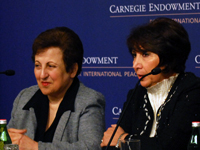Registration
You will receive an email confirming your registration.
As popular protest movements are sweeping through the Middle East and North Africa, democracy advocates in Iran have struggled to gain ground against a violently repressive regime. At an event hosted by Carnegie, distinguished Iranian human rights lawyer and Nobel Peace Prize laureate Shirin Ebadi presented her new book, The Golden Cage: Three Brothers, Three Choices, One Destiny, a biographical account of Iran’s long and unsuccessful struggle to free itself from authoritarian rule. Ebadi also discussed the current state of Iran’s democracy and human rights movement, and the obstacles they face. Carnegie’s Karim Sadjadpour moderated the conversation.
The History of a Family and a Nation
The Golden Cage recounts the true story of the family of Ebadi’s close childhood friend, whose three brothers each adopted a different ideology: monarchism, communism, and Islamism. These dogmas brought the brothers to ruin and tore their family apart. Their story is a microcosm of the history and tragedy of modern Iran, Sadjadpour explained.
- Revealing injustice: Ebadi argued that stories are a potent way of revealing injustice; the narratives of real people can be more powerful than pure history. Many of the issues discussed in the book continue to be relevant today, she added. For example, the relatives of communists massacred in the late 1980s continue to be repressed by security forces when they travel to commemorate the deaths of their loved ones.
- Reflecting on the revolution: In her book, Ebadi describes the initial popular support for the 1979 revolution. The motto of the revolution was “independence and freedom,” she said. “I am still fighting for those things. We were promised both in the Islamic Republic. Yet we did not gain political freedoms and instead lost the personal freedoms we had under the Shah, such as the right to choose whether to wear the veil.”
- Women at the vanguard: The book’s strong female protagonist is a symbol of Iranian women, Ebadi added. The feminist movement in Iran is the strongest in the Middle East, she explained, because Iranian women are highly educated. Women make up over 60 percent of university students and play a role in all important aspects of society. Yet the Islamic Republic has discriminated against women and continues to discount their lives and rights. This has created a backlash and women have been pioneers in every protest. Democracy will be brought to Iran by strong women, Ebadi contended.
Prospects for Change
Ebadi discussed the potential for reform and the challenges Iran’s democracy and human rights advocates continue to face.
- Revolution or reform: Given the bitter experience of 1979, no one in Iran romanticizes revolution anymore, Sadjadpour said, but nor has the Islamic Republic shown itself capable of reforming. Ebadi explained that the Green Movement, Iran’s chief opposition movement, is split between those who want a completely new constitution and those who want to pressure the government to implement existing constitutional protections for human rights. The first option will likely provoke bloodshed, but the government has not shown any flexibility toward the latter alternative, so only the future will tell which approach will prevail and at what cost, she added.
- Chipping away at the regime: Non-violent opposition has unfortunately not worked so far, Ebadi said, and the regime has only become more brutal. Yet a government that uses violence against its own people will only grow weaker over time, she argued. For every person jailed or killed by the regime, at least ten of his or her friends or family will join the opposition.
- Revolution and the military: Unlike in Egypt or Tunisia, the Revolutionary Guards in Iran have up until now sided with the regime, not the nation. Toppling the regime will thus be more difficult, Ebadi warned.
- Searching for justice: It is not yet clear what would happen to human rights violators after an eventual transition in Iran, Ebadi noted. The truth and reconciliation policy worked in post-apartheid South Africa but has faced problems elsewhere, she said. Iran’s path will be determined by its own unique circumstances.
United States Policy toward Iran
Ebadi commented on the United States’ twin efforts to support human rights in Iran and contain its nuclear program.
- Support for Human Rights: President Obama’s latest Nowruz address, directed to the Iranian people on the occasion of the Iranian New Year, was a positive step forward in showing U.S. support for the rights of Iranians, Ebadi said. However, she suggested that the United States could do more to help Iranians bypass government controls on the Internet.
- Iran’s Nuclear Program: Iran’s enrichment program is not as much of an issue of national pride as the Iranian government claims, Ebadi argued, and Iranians have other more pressing concerns. Given Iran’s susceptibility to earthquakes, many Iranians are also worried about the possibility of a Fukushima-type accident in Iran. With regard to economic sanctions, she said the United States is justified in regulating its trade with Iran according to its own interests. However, President Obama should continue to show restraint and not directly threaten Iran. Iranians don’t respond well to threats, Ebadi cautioned.
